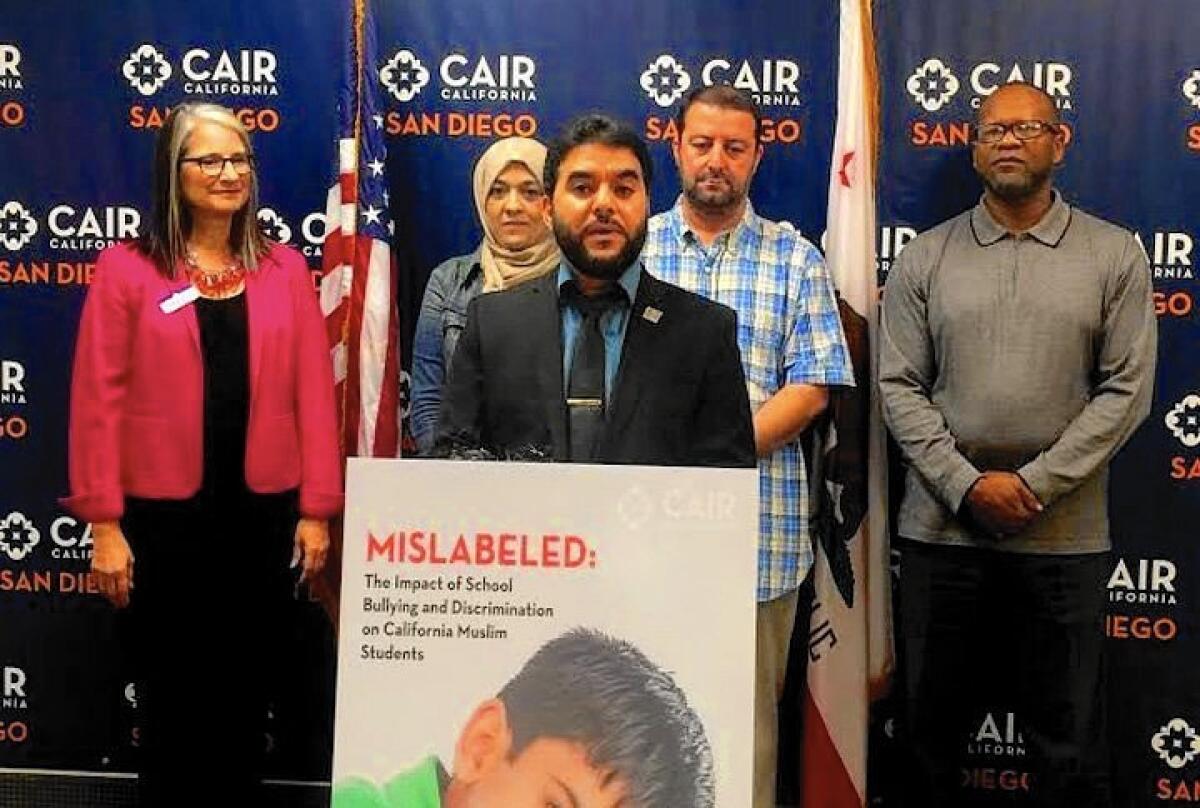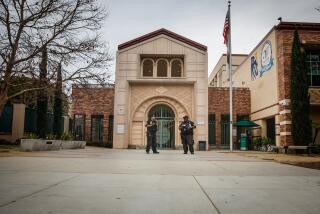Muslim students report bullying at twice the rate of non-Muslim peers, survey shows

Hanif Mohebi, executive director of the San Diego office of the Council on American-Islamic Relations, speaks at a news conference Friday about the bullying of Muslim students in schools.
Muslim students in California schools report being bullied and discriminated against at significantly higher rates than their peers, according to a study released Friday by the Council on American-Islamic Relations.
The report is based on a 2014 statewide survey of more than 600 Muslim American students ages 11-18, who described incidents of discomfort in the classroom, cyberbullying, negative reactions to wearing a hijab and to religious-accommodation requests, negativity from teachers and increased scrutiny after the Sept. 11 terrorist attacks.
The organization administered the survey to raise awareness of the challenges young Muslims face in the United States.
“We really want to make sure we serve our young people, our young generation,” said Hanif Mohebi, executive director of the council’s San Diego office. “If we don’t do that, we won’t be in a good place.”
An estimated 170 students in San Diego County took part in the survey, the highest number out of 23 participating counties. The survey was provided to American Muslim students enrolled in public and non-Muslim private schools in California.
Among the survey results:
About 55% of the Muslim students surveyed said they’ve been bullied or discriminated against, twice the number of students nationally who reported being bullied.
About 29% of students who wear hijabs said they experienced offensive touching or pulling of their hijab.
About 20% of students said they experienced discrimination by a school staff member.
An estimated 76% of respondents said they felt comfortable participating in discussions about Islam or countries where Muslims live, down 4% from the organization’s 2012 survey.
“Your existence is always interrogated, investigated and questioned,” said one student in the report.
Religious leaders said conditions for Muslims across the country have become increasingly challenging in the past 15 years, as the rise of radical Islam has increased stereotypes portraying all Muslims as terrorists.
“That is dangerous. We need to realize that and do something about it,” Mohebi said during a news conference Friday morning.
An employee who oversees the San Diego Unified School District’s anti-bullying program was not immediately available for comment about the report. The district’s “anti-bullying and intimidation prohibition policy” prohibits students from discriminating against their peers for any reason, including religion. Students and educators who witness discrimination are required to report it immediately, according to the district’s website.
The district also has trained staff members who address issues when they come up, according to a district spokeswoman.
Taha Hassane, imam and director of the Islamic Center of San Diego, said many parents share instances in which their kids were bullied at school because of their religion. Hassane, who has four daughters in public schools, has had discussions with them.
“They come back from school to tell me and my wife about a comment they’ve heard from a classmate or a conversation that took place in the classroom where Muslims were portrayed in an inappropriate way,” he said.
“Most of the time I tell them, ‘You need to take this as an opportunity to educate your classmates about what Islam is all about and who Muslims are.’”
Hassane said bullying against Muslims has persisted in part because parents are hesitant to report the behavior to administrators or school leaders.
“The majority of members of my community are immigrants, and from where they come from, the culture doesn’t help them in being proactive, in reporting these incidents,” he said. “Most of the parents, when they hear something from their kids they say, ‘just be patient … everything will be OK.’ ”
Mohebi said a significant lack of reports or records of bullying incidents is what led the organization to launch its surveys. The Council on American-Islamic Relations conducted its first survey in 2012, when nearly half of the Muslim students who participated said they’d been targeted because of their religion.
Tatiana Sanchez is a staff writer for the San Diego Union-Tribune.
More to Read
Sign up for Essential California
The most important California stories and recommendations in your inbox every morning.
You may occasionally receive promotional content from the Los Angeles Times.










